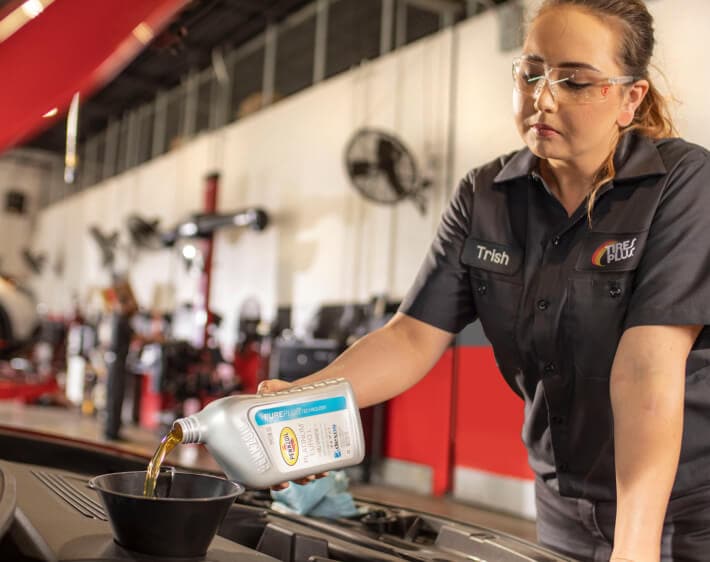Monitoring your motor oil is a fundamental part of car ownership and maintenance. Motor oil keeps your engine lubricated and running smoothly. But with all the different types of oil out there, you may be wondering if you can mix synthetic oil with regular oil (or vice versa).
Keep reading to find out what happens when you add synthetic oil to regular or "conventional" oil, the possible consequences of mixing engine oil types, and why getting professional help when switching from one motor oil type to another might be the smartest move.
Can You Mix Synthetic Oil with Regular Oil?
The short answer is…yes.
If you don't have a choice, adding synthetic oil to regular oil can help you out in a pinch. However, this should only be a stop-gap until you get to your nearest oil change provider. If you want to strike a balance between the affordability of conventional oil and the benefits of synthetic oil, opt for a professionally-mixed synthetic blend.
Since motor oils are generally made from the same ingredients (base oil and additives), they are typically compatible when mixed. (The American Petroleum Industry actually requires that all motor oil made in the U.S. be compatible with one another.) The differences mostly come down to the oil refining process. Conventional oil, while cheaper than synthetic, is less refined and can lead to more engine sludge and gunk build-up down the road. Synthetic oil, on the other hand, is slightly more expensive but contains fewer impurities and can, therefore, keep your engine cleaner and lubricated for longer. Pennzoil synthetic oil is actually even purer, as it is not made from crude oil. It is the first motor oil made from natural gas. Learn more about Pennzoil ingredients in this video.
Keep in mind that mixing synthetic and conventional oil dilutes the beneficial effects of higher quality synthetic oil. Not only does this devalue your synthetic oil investment, but it may also lead to you needing an oil change earlier than expected.
Also, consider that even though motor oils contain the same essential ingredients, they each have different additives, chemical properties, and detergents. Mixing different types can destabilize your motor oil, reducing its efficiency and affecting your engine's performance.
The smartest choice is to stick with the oil type and oil change intervals recommended by your car's manufacturer and visit your local car care experts for affordable services. Always consult your owner’s manual for the correct viscosity grade and performance recommendation required for your vehicle.
Should You Top-Off Your Car's Oil?
It's important to keep oil at safe and clean levels to avoid engine trouble. Many people do this by topping off their motor oil in-between oil changes. This is often how motor oil types get mixed.
While the occasional oil top-off is usually okay, getting an oil change is always the best way to keep your engine running smoothly. If you must top-off your oil, try to use the same type that's already in your vehicle to avoid losing any of its benefits.
As always, double-check your manufacturer-recommended service schedule or visit a Tires Plus location to get all of the service and oil type recommendations with none of the pressure.
Switching Engine Oil Types
Are you thinking about changing to a different type of motor oil? Switching is easy! Visit your nearest Tires Plus location and ask for an oil change with the Pennzoil oil of your choice. If you're not sure what kind of oil might be best for your car, our certified technicians are ready to answer all your questions.



